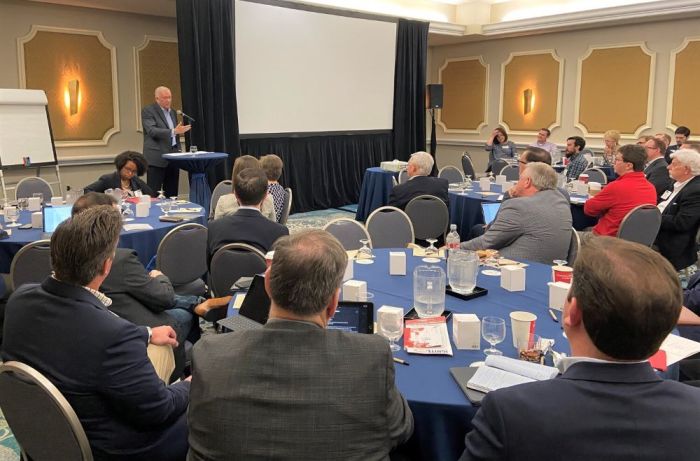New alliance unites seminaries, Christian colleges and schools amid ongoing struggles

Dozens of Christian colleges, high schools, seminaries and Bible colleges have banded together to form an alliance uniting all sectors of Christian education to address the mutual challenges they face in an increasingly secular culture.
“Over the last several years, I think a variety of people have been recognizing that various sectors of Christian education have been facing similar challenges,” David Dockery, the chancellor of Trinity International University in Illinois and president of the new International Alliance for Christian Education, told The Christian Post.
“We realized that K through 12 schools are addressing these challenges and so are Bible colleges and Christian colleges and seminaries. We'd never worked together because we thought we had our own issues and our own demographic context in which to serve. And we thought that perhaps we could link arms and address some of the challenges better in a synergistic way.”
Dockery said that no organization or network in the past has tried to bridge Christian primary schools, secondary schools, gap-year programs, seminaries and colleges.
“We've always kind of worked in our own silos,” Dockery admitted. “So this is an attempt to link Christian education as a whole.”
IACE held its inaugural meeting in Orlando, Florida, attended by 100 people on Feb. 12-14.
According to the IACE website, the network seeks to help its members and partners “focus on the distinctive mission of Christian education” by “strengthening confessional commitments,” and sharing efforts to “reclaim and advance the best of the Christian intellectual tradition.”
“There was a lot of interest and a great deal of hopefulness about pulling people together with shared commitments and working together collaboratively to advance a distinctive form of Christian education,” Dockery said of the February gathering.
The alliance, which spans denominational lines, includes member schools from across the globe in places like Asia, Africa and Latin America.
At least 55 colleges and seminaries are members of the alliance. Through the alliance's seven partner organizations, it's connected with another 175 Bible colleges and 750 Christian primary and secondary schools.
The association’s members have a shared commitment to the Nicene Creed and the Lausanne Covenant.
Partner organizations include the Alliance Defending Freedom, The Southern Baptist Convention’s Ethics & Religious Liberty Commission, the Colson Center for a Christian worldview and the international mission organization TeachBeyond.
Considering partner organizations also include the Association for Biblical Higher Education and the Association of Christian Schools International, Dockery assured that the goal of the new network is not to replace other Christian educational associations that have existed for years.
“Initially, some people were nervous that we were recreating the wheel and duplicating some of their efforts,” Dockery said. “But I think as everyone's taking a closer look, they realize that there is a way they can relate to at least an aspect of what we're doing.”
Dockery told CP that IACE has a warm relationship with the Council for Christian Colleges and Universities, which has over 150 member colleges in the U.S., including Docker’s own Trinity International.
He said the CCCU has been very generous in offering to partner with the IACE with student programs.
Among the similar challenges that Christian schools and colleges are facing is the fact that there seems to be fewer connections today between churches and educational institutions, Dockery said.
Additionally, Christian schools that uphold traditional orthodoxy on sex and marriage could face issues presented by LGBT nondiscrimination ordinances.
“The reality that we find ourselves in a secular age calls for us to respond not by yielding to secularization but by finding ways to ensure that Christian faith will be passed to the next generation,” Dockery explained. “And we believe that schools at all levels play an important part in that.”
“We do that by recognizing that we're not trying to do something new, but we're trying to do something that's been consistent with the church's history,” Dockery added. “So we've put a strong emphasis on reclaiming the Christian intellectual tradition, as a way of addressing that.”
When it comes to issues of human sexuality in the culture and the challenges being felt from a legal and governmental standpoint, IACE seeks to help schools navigate those challenges.
Much like secular private institutions, several Christian schools across the nation are also struggling financially due to low enrollment.
“Really since 2008, Christian Schools have been feeling more and more stretched,” Dockery said. “We realized we need to look for ways not to duplicate effort but to share the effort to create partnerships, collaborations and look for creative ways that would help us be better stewards of the resources we have been given.”
Dockery said a section of IACE’s inaugural meeting in February was dedicated to the “need for innovation” and to “think of fresh ways” to approach the issues of low enrollment.
Dockery said the stay-at-home orders that have come in response to the ongoing COVID-19 pandemic has caused Christian education institutions to “move into an innovative mindset.”
“It’s been an amazing transition to watch everyone move to different delivery modes of doing education. We’re all homeschoolers and online educators now because the meeting in the brick-and-mortar classrooms is not a reality right now and will be for the rest of the semester. I think we have to be planning for the possibility that it won't be in the fall.”
The last several entries on IACE’s online blog have focused on the delivery of online education.
“We want to make sure institutions can be sustained in the midst of these challenges and fortify new ways of doing educational delivery that we now all share,” Dockery said. “I think everyone had some piece of online education, but I don't think anyone realized it would be front and center in this way right now.”




























